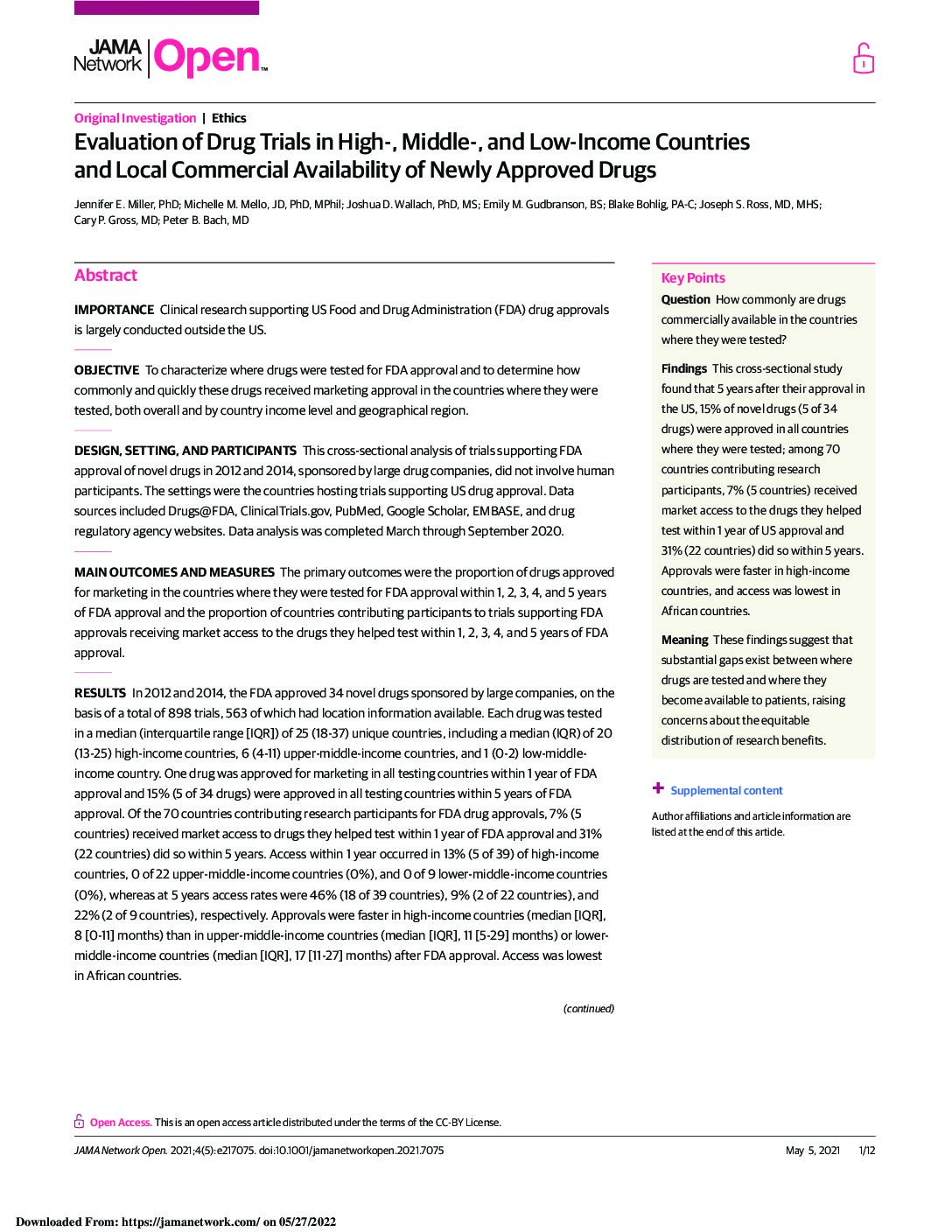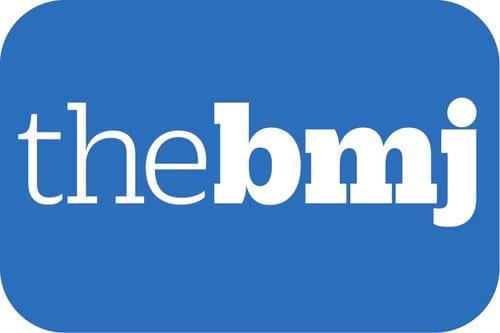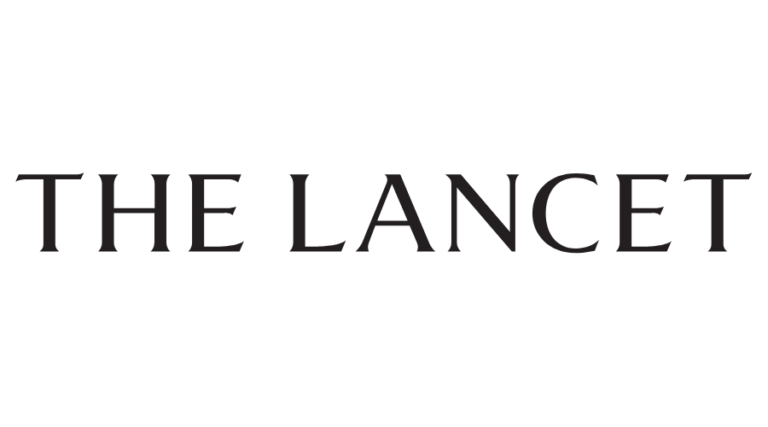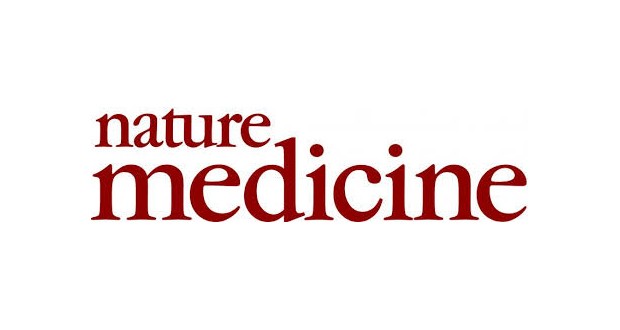Objective To develop a measure for fair inclusion in pivotal trials by assessing transparency and representation of enrolled women, older adults (aged 65 years and older), and racially and ethnically minoritized patients.
Design Retrospective cross sectional study of sponsors of novel oncology therapeutics approved by the FDA 2012-2017
Results Between 2012 and 2017, the FDA approved 59 novel cancer therapeutics, submitted by 25 sponsors (all industry companies) on the basis of 64 pivotal trials. All 25 sponsors (100%) reported participant sex, 10 (40%) reported age, and six (24%) reported race and ethnicity. Although 14 (56%) sponsors had adequate representation of women in trials, only six (24%) adequately represented older adults, and four (16%) adequately represented racially and ethnically minoritized patients (black, Asian, Hispanic or Latinx). On overall fair inclusion, one sponsor scored 100% and the median sponsor score was 81% (interquartile range 75-87%). More than half of sponsors (13 (56%) of 25) fairly included women, 20% (n=5) fairly included older adults, and 4% (n=1) fairly included racially and ethnically minoritized patients in trials. 80% of product had pivotal trials that fairly included women, 24% fairly included older adults, and 5% fairly included racially and ethnically minoritized patients.
, Gross CP, Miller JE., Metrics, baseline scores, and a tool to improve sponsor performance on clinical trial diversity: retrospective cross sectional study,
Question How commonly are drugs commercially available in the countries where they were tested?
Findings This cross-sectional study found that 5 years after their approval in the US, 15% of novel drugs (5 of 34 drugs) were approved in all countries where they were tested; among 70 countries contributing research participants, 7% (5 countries) received market access to the drugs they helped test within 1 year of US approval and 31% (22 countries) did so within 5 years. Approvals were faster in high-income countries, and access was lowest in African countries.
Meaning These findings suggest that substantial gaps exist between where drugs are tested and where they become available to patients, raising concerns about the equitable distribution of research benefits.

New medicines and vaccines are predominantly tested in high-income countries. However, as the COVID-19 pandemic highlighted, the populations who can benefit from these interventions are not limited to these wealthier regions. One-third of novel Food and Drug Administration approved drugs, sponsored by large companies, treat infectious diseases like tuberculosis and HIV, which disproportionately affect low-income and middle-income countries (LMICs). The medicines for non-communicable diseases (NCDs) are also relevant to LMIC health needs, as over three-quarters of deaths from NCDs occur in LMICs. There are concerns clinical trial data may not extrapolate across geographical regions, as product effectiveness can vary substantially by region. The pentavalent rotavirus vaccine, for example, had markedly lower efficacy in LMICs. Efficacy variations have also been found for other vaccines and drugs. We argue there are strong ethical arguments for remedying some of this uneven distribution of clinical trial sites by geography and income. Chief among them, is that these disparities can impede equitable access to the benefits of clinical research, such as representation in the evidence base generated to guide prescribing and use of medicines and vaccines. We suggest trial site locations should be made more transparent and for later stage trials their selection should be informed by the global distribution of disease burden targeted by an experimental product. Countries with high prevalence, incidence, severity or infection transmission rates for targeted diseases should have real opportunities to engage in and enrol their populations in trials for novel medicines and vaccines. Citation: , Ethical considerations in international clinical trial site selection,

(Lancet) More than 1·8 million lives have been lost due to COVID-19. Two frontrunner vaccines from Moderna and Pfizer-BioNTech promise some relief, with data suggesting 95% efficacy, 1 and have been granted emergency use authorisations in several countries. In an open letter 2 responding to these developments, participants in COVID-19 vaccine trials argued that those who received placebos should be unmasked and given priority access to authorised vaccines. The letter cited the American Medical Association’s Code of Medical Ethics, which highlights the importance of minimising the time research participants spend in a placebo group.
Fulfilling these requests could help to foster trust in medicine and research, reward those who take risks for the many, and prevent future harm from COVID-19 for these participants. However, granting these requests also comes with tradeoffs and highlights competing interests inherent in vaccine development. Importantly, these requests also reveal shortcomings in bioethical resources, particularly clinical equipoise conceptualisations. Read more: https://www.thelancet.com/article/S0140-6736(21)00198-7/fulltext

Miller, JE and Price, A. Data sharing in clinical trials: keeping score. BMJ. 2019
There are many questions over who should have access to health data and who owns them. These issues are complicated in clinical trials where data are co-produced by participants, researchers, clinicians, funders, and industry. Ninety percent of all data ever produced were produced in the past two years, raising novel ethical questions about the responsibilities of data collectors and the rights of participants. [1] These questions are particularly acute for clinical trial data, which hold life-saving potential and can advance patient and population health…

Miller J, Ross J, Wilenzick M, Mello M. Sharing of clinical trial data and results reporting practices among large pharmaceutical companies: cross sectional descriptive study and pilot of a tool to improve company practices BMJ 2019; 366
Public expectations for transparency in the conduct and reporting of clinical trials continue to evolve. Today, the transparency discussion has shifted to new terrain: sharing of patient level clinical trial data. Evaluating and tracking progress on the implementation of data sharing among pharmaceutical companies is, however, difficult. Existing guidelines for what should be shared, how, and when vary widely and are often vague. As part of a larger project called the Good Pharma Scorecard, we developed a harmonized, practical set of measures and a tool for assessing sharing of participant level clinical trial data by research sponsors and applied them to measure policies and practices among large pharmaceutical companies with drugs newly approved by the FDA in 2015. We also evaluated the feasibility of the tool (a ranking system) in improving companies’ practices. We found 25% of large pharmaceutical companies fully met the data sharing measure. Given feedback and a chance to improve their policies to meet this measure, three companies made amendments, raising the percentage of companies in full compliance to 33%.

Jeremy Puthumana, MS; Jennifer E. Miller, PhD; Jeanie Kim, JD; et al Joseph S. Ross, MD, MHS. JAMA Network Open. 2018;1(2):e180283. doi:10.1001/jamanetworkopen.2018.0283
The Right to Try Act of 2017 allows patients with life-threatening conditions to access investigational medicines outside clinical trials without oversight from the US Food and Drug Administration (FDA). A better understanding of existing expanded access programs can inform the consideration and implementation of both the federal Right to Try Act and state right-to-try laws.

Cross-sectional descriptive analysis of all clinical trials supporting 2014 Food and Drugs Administration (FDA)-approved new drug applications (NDAs) for novel drugs sponsored by large companies.

Jennifer E. Miller, Joseph S. Ross, Kenneth I. Moch and Arthur L. Caplan BMC Research Notes 2017 10:350 https://doi.org/10.1186/s13104-017-2687-5
We sought to determine the characteristics of “expanded access” and “compassionate use” programs registered in ClinicalTrials.gov and to determine the percentage of drugs provided through these programs that ultimately received FDA marketing approval.

Disclosing clinical trial data is a step in the right direction towards transparency, which benefits both the public and the pharmaceutical industry.

Trial disclosures for new drugs remain below legal and ethics standards, with wide variation in practices among drugs and their sponsors. Best practices are emerging. 2 of our 10 reviewed companies disclosed all trials and complied with legal disclosure requirements for their 2012 approved drugs. Ranking new drugs on transparency criteria may improve compliance with legal and ethics standards and the quality of medical knowledge

The intent of the first national clinical trials registry for cancer therapies was to help doctors find open trials in which to enroll their patients and to help researchers maintain a steady supply of research participants. However, it ended up exposing corrupt practices and tensions between ethics, the corporate need for profits, and public health goals. How did this happen?

This article explores whether the bioethical performance and trustworthiness of pharmaceutical companies can be improved by harnessing market forces through the use of accreditation, certification, or rating.

After years of decline in the public eye, drug companies should implement a bioethics accreditation or rating program to help appropriately restore the industry’s good name and improve its effectiveness in advancing global health and new treatments.
